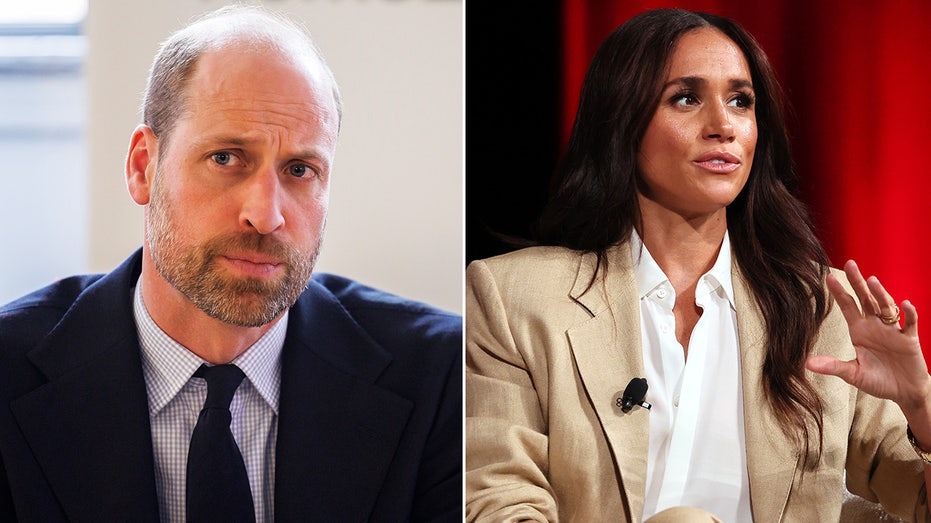Recent discussions in royal circles have focused on the implications of Meghan Markle’s royal title, particularly in light of her estrangement from the British royal family. According to experts, while Prince William does not possess the power to revoke her title, the ramifications of its use could become contentious.
Meghan Markle, who became the Duchess of Sussex upon marriage to Prince Harry, continues to retain her royal title despite stepping back from royal duties in early 2020. The couple’s decision to leave the UK and primarily reside in the United States generated significant media coverage and public debate, drawing both support and criticism from various quarters.
As the royal family dynamic evolves, Prince William has emerged as a prominent figure. As the Duke of Cambridge and second in line to the throne, he is resolute in upholding the monarchy’s values. However, according to royal commentators, any discussions related to the potential removal of titles are usually rooted in tradition and protocol, making them complex and sensitive.
Sources indicate that while Prince William might wish to distance the royal family from the controversies surrounding Markle, the legalities regarding royal titles are intricate. Expert opinions reveal that titles such as ‘Duke’ or ‘Duchess’ are granted by the reigning monarch and do not necessarily lend themselves to easy revocation.
Philip Murphy, a royal historian, explained, “The process of stripping someone of a royal title is not straightforward; it requires significant legal and procedural steps, and ultimately falls under the jurisdiction of the monarch. Thus, even if William desires to take action, he cannot do so independently.”
Markle’s continued use of her title has not gone unnoticed. Many speculate that the media coverage surrounding her, particularly given her recent public engagements and charitable activities, could come with its own set of challenges. Despite her status as a member of the royal family, her actions often incite varying opinions within the public and media realms.
Expert commentators caution that while Markle is entitled to use her royal title, it may have unforeseen implications for her image and public acceptance. Tom Bower, a royal biographer, pointed out, “The title itself can be a double-edged sword. While it provides recognition, it also keeps Meghan in the royal spotlight, which can amplify scrutiny of her actions and statements.”
Additionally, Markle’s background as an American actress adds a layer of complexity to her royal title; many are torn between appreciating her contributions to modernizing the monarchy and critiquing her perceived departures from royal tradition. The contrast between her American roots and the traditions of British royalty results in mixed responses, influencing public perception.
Furthermore, the title is associated with a broader expectation of duty and representation that Meghan and Harry chose to step away from. The couple’s departure raised questions about their ongoing role within the royal family and how they embody the modern monarchy.
Another aspect that plays a significant role in the conversation is Meghan’s recent appearances, including her attendance at charity events and public engagements. Tensions can mount as observers evaluate the effectiveness and validity of her actions in light of her royal title. Observers noted that her royal title provides a platform, but one that subjects her to a considerable level of public scrutiny.
As discussions around the royal family develop, the question of how Prince William and the royal family operate in this climate remains paramount. Experts argue that any strategic considerations regarding the branding of the monarchy should take into account the modern context of celebrity and public relations, which differs markedly from previous eras.
Public relations expert Jane Lee stated, “The royal family must tread carefully. While tradition is vital, modernizing the image of the monarchy is equally crucial. They can’t ignore public sentiment, and they need to balance tradition with a contemporary approach.”
In light of these ongoing developments, Meghan’s public persona remains continually under the microscope. The media’s appetite for royal news, particularly about Meghan and Harry, shows no signs of abating. As such, her title could become intertwined with the narrative surrounding the current generation of royals, influencing both public perception and the royal family’s strategy.
With major life changes occurring and public engagements shaping perceptions, it is clear that Meghan’s royal title is not just a matter of heritage; it’s tied to her ability to navigate the complex relationship with the public, the media, and the royal family itself.
Experts note that whether or not Prince William considers the dynamics surrounding Meghan’s title, he must also be aware of the implications for the monarchy as a whole. Understanding Meghan’s royal title in this context requires an acknowledgment of the broader challenges that modern royalty faces in today’s societal landscape.
In conclusion, while Prince William may desire to distance the royal family from Meghan Markle’s actions, the current frameworks do not allow for the stripping of her title without significant royal deliberation. Moreover, it is important to recognize that the title itself may carry both advantages and challenges for Markle as she continues to navigate her life in the public eye. The ongoing discourse surrounding her title embodies a very modern debate about tradition, identity, and the complexities of maintaining a royal presence in the contemporary media landscape.
































